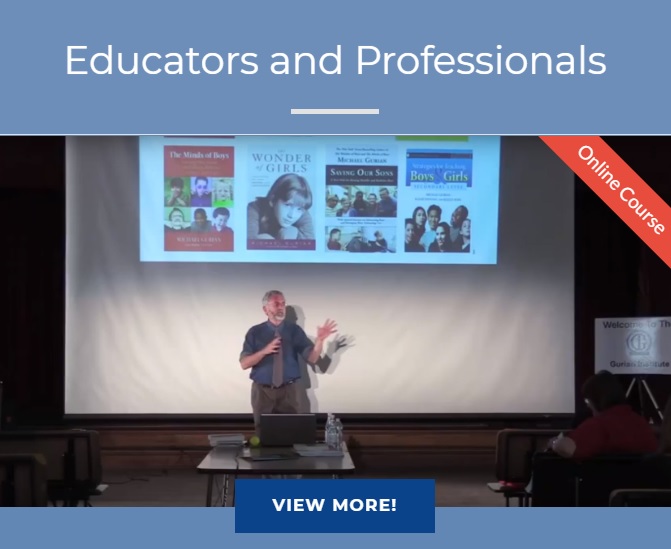Eva Dwight, M.Ed., one of our featured speakers at this year’s Gurian Summer Training Institute, wrote this informative and practical blog featuring a key subject in children’s lives. We hope you find her wisdom useful. To learn more about our event or to register, please visit https://gurianinstitute.
From Eva:
As a junior high counselor for 20 years, I frequently rolled my eyes at the ridiculousness of what we adults casually term “girl drama”—forgetting that I was once the star of my very own teenage soap opera!
When I was in high school, one of my best friends would regularly pick a fight with me, which usually looked like her shunning me for a day or two, and after some tearful begging on my part, revealing what I’d inadvertently done to offend her. She would lovingly forgive me, we’d hug, express how much we meant to each other, spend hours on the phone talking about nothing, go for long walks, and be back to Best Friends Forever…until she decided we needed a little more drama in our friendship, and the cycle would start all over again.
More recently, I learned that there’s brain science that explains why girls engage in this confusing behavior. In The Minds of Girls, Dr. Michael Gurian explains the science behind it and argues that as long as “drama” doesn’t turn into bullying or violence, it can actually be a healthy, though painful, way girls establish independence, learn to set personal boundaries, and build resilience and strength.
The brain chemical oxytocin plays an important role in girls’ social-emotional experience. Girls produce it in much higher levels than boys, and it promotes strong nurturing and bonding by enhancing their ability to tune into others’ facial and social cues. Ironically, at the same time girls’ brains want to bond, there’s a natural tendency to also seek psychological separateness, as independence becomes an important part of successful adult functioning. So, oxytocin’s gift of increased social bonding becomes a challenge when a girl reads too much into facial and social cues, misinterprets the message, and starts her cingulate gyrus spinning.
The cingulate gyrus, also known as the instant replay part of the brain, is generally more active in girls than in boys. This makes it easier for a girl to get into what Dr. Gurian calls a “rumination loop”, meaning she plays that scene over and over in her brain, making it bigger and worse, attributing negative motives to the person who “gave her that look” and potentially catastrophizing the outcome. Picture a girl running on a hamster wheel, unable to step off until someone helps her pull on the brake.
Educators, counselors and parents can assist girls in developing a braking system by teaching skills for navigating these social-emotional challenges:
- Ventilating and talking about what she feels is important, as is good listening and parental patience.
- While venting can be helpful, adults also need to help girls self-regulate emotions by kindly and firmly cutting off ventilation when the time is right for problem-solving/trouble-shooting. It’s okay to reflect what you hear from her, e.g. “It sounds like you feel _____ because _____,” then suggest that it might be helpful to shift from feeling to thinking.
- One way to help a girl finish her processing (at least for the moment) is to encourage her to walk with you to another room, step outside for a walk, or move to another chair–this creates a sense of almost literally “moving on”. She will likely still return to her hurt feelings at some later time, but the ritual will be established.
- If you suspect that a girl might be misinterpreting her friend’s behavior, ask her to look for evidence of her interpretation. Whether she finds any or not, practice with her what she might say to the other person as she attempts to rectify the situation. This can help her gain perspective and engage in strategic thinking.
- Talk with her as much as needed to help her determine what boundaries she might want to set so that she maintains her own dignity and self-respect—and even what she’ll do if the other person doesn’t want to resolve the problem, for example, does that friendship need to end?
Dr. Gurian cautions against adults stepping in too much and trying to fix the problem too much, because research indicates that too much intervention leads to immaturity and, potentially, a child’s inability to problem-solve successfully and completely for herself. Better would be to help girls learn skills, which in turn assists them in their development of self-confidence and self-esteem.
At the same time, if the drama is turning violent or causing a girl to exhibit signs of either depression or anxiety, adults should step in very quickly in order to ensure that girls are safe and, if necessary, that they receive appropriate mental health interventions.
At the Gurian Summer Training Institute in Carlsbad, CA June 23rd, I’ll be facilitating a breakout session called Soothing the Stress Response in Girls and Handling Girl Drama. This workshop is set up so that educators, counselors and parents can understand better what’s happening for girls, and practice strategies for mitigating both the drama itself, and the harmful effects it can have on self-esteem and self-confidence.
I hope you’ll join me, Dr. Gurian, and many other Gurian Institute Trainers at this event for a fabulous weekend learning how we can use brain science to help us in our efforts to educate, counsel, and raise our children to become successful, empowered, and resilient adults.
Eva Dwight, M.Ed.










